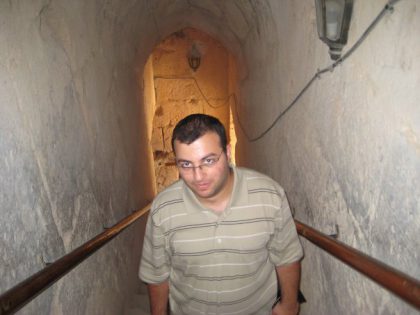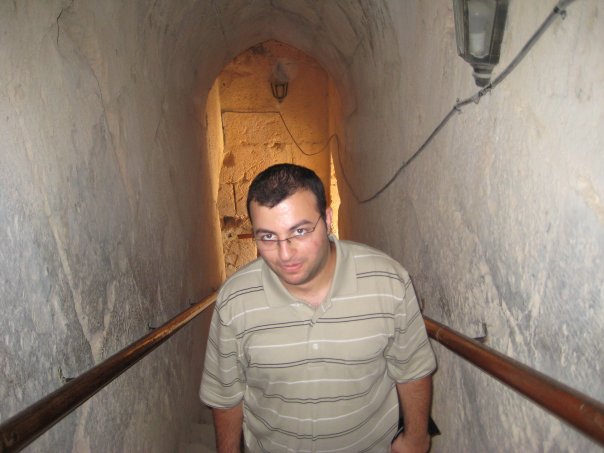
 By Margarita Hovhannisyan
By Margarita Hovhannisyan
Azad-Hye
Ara Hovsepian is an Armenian from Kessab. Before moving to Armenia permanently, he had lived here for a few years (2001-2006) and left after he completed his studies and got his diploma. In 2011 he came back, this time, to stay for good.
“Before settling down, I visited Armenia one more time in 2010 and stayed for two months. I studied every aspect of life here and concluded -without a doubt- that an Armenian should only live in Armenia.”
Ara considers his hometown Kessab also to be his homeland, because the Armenians there aren't immigrants. The village has Armenian origin and it was part of the Cilician Armenia in the past. During the massacre in 1915, the inhabitants of Kessab left their land only for 5-6 years and then returned and settled in their houses again. After the massacre, the number of Armenians in Kessab decreased, first because of the emigration in the 1940s, during the repatriation, and later in the 1980s, when a new wave of migration started.
“Recently, the locals have also started migrating to the Emirates and now the population in kessab does not exceed 1500 people. I myself have lived in Dubai for a few years before moving here. I'm happy I had that experience, as it made me realize how much I love and appreciate Armenia. It would have been extremely difficult for me to adapt to Dubai, knowing what is waiting for me in Armenia. Everything is mechanical and automatic there; life is mechanical, even people are. It's very difficult to live there if you love your homeland.?
Ara remembers the first years of his life in Armenia with a big smile on his face. He has been in ridiculous situations, because of the different way of living, different dialect and different climatic conditions.
“It was really difficult to understand the dialect at first. It seemed to me that everyone knew my name, since they address each other with the word ara, which means hey you.” Of course, later, he got used to everything that seemed unusual at first.
“The main reason I moved here is because I loved the country so much. When I was a college student, I got acquainted with many of its issues and difficulties, yet, after living for a while, I was unable to find my peace anywhere else.
Too bad my beloved hometown has changed. It's not the Kessab we used to know. It's full of foreigners now and unfortunately, Armenians won't survive there very long.”
Ara finds it strange when Armenian families in the Diaspora consider it a big success if one of their children could speak Armenian well.
“As a future parent, I feel terrible about the fact that maybe one day my child would utter his first words in another language. For example, my brother, who is currently living in Dubai, bends over backwards to raise his children as Armenians. But I can see and feel how difficult it is -If not impossible- to do so.”
“Unfortunately, with every passing day, the Armenian spirit is being swept away from the Diaspora. In my opinion, every generation is responsible for raising the next generation right.”
Ara is a computer programmer by profession. He works at the Yerevan Branch of an American company. He is happy that it didn't take him so long to find a job.
“I found my job through the ads, where a few offers grabbed my attention. I went to the interviews and chose what suited me the most. Although I'm making three times less than I used to make in the Emirates, I am happy and content. I'm happy that I am in my motherland and I'm living among people who are like me. I can see my future here. I'm not asking for much. Just a peaceful and an Armenian kind of life.?
Translated by Nanor Mikayelian
TEXT IN ARMENIAN
Արա Հովսեփյան. ?Միայն հայրենիքում կգոյատեւի հայը?
Մարգարիտա Հովհաննիսյան
Ազատ-Հայ
Արա Հովսեփյանը քեսաբցի հայ է: Նախքան Հայաստան վերջնական տեղափոխվելը, մի քանի տարի ապրել է այստեղ` 2001-2006-ին բարձրագույն կրթությունը ստանալով Երեւանում: Իսկ 2011-ին արդեն Հայաստանի Հանրապետություն է գալիս, որպես երկրի հիմնական բնակիչ:
– Նախքան հաստատվելս 2010-ին մեկ հատ էլ եկա Հայաստան, երկու ամիս մնացի, վերջնականապես ուսումնասիրեցի ու առանց երկմտելու վճռեցի` հայը միայն Հայրենիքում պիտի ապրի:
Արան իր ծննդավայրը` Քեսաբը, նույնպես հայրենիք է համարում, որովհետեւ տեղի հայերը ներգաղթած չեն. գյուղաքաղաքը հայկական ծագում ունի ու ժամանակին Կիլիկյան Հայաստանի կազմի մեջ է եղել: 1915-ի ջարդերի ժամանակ քեսաբցիները ընդամենը հինգ-վեց տարով են լքել տեղանքը, այնուհետեւ նորից հաստատվել իրենց օջախներում: Կոտորածից հետո հիմնական հայաթափումը Քեսաբում արտագաղթի պատճառով է եղել` 1940-ականների հայրենադարձության ժամանակ եւ 1980-ականներին, երբ տեղացիների գաղթի նոր հոսանք է սկսվել:
– Վերջերս էլ շատերը Էմիրութիւններ են գնում ու հիմա Քեսաբի բնակչության թիվը ոչ ավել է, քան 1500 մարդ: Ես նույնպես մինչ գալս մի քանի տարի Դուբայում ապրեցի. այդ տարիները թեեւ օտարության մեջ անցկացրեցի, բայց իրենց հատուկ դերն ունեցան Հայաստանը առավել սիրելուս եւ գնահատելուս հարցում: Հայրենիքը որոշ չափով ճանաչած մարդու համար անչափ դժվար պիտի ըլլար Դուբային հարմարվելը: Այնտեղ ամեն ինչ մեխանիկական է, կյանքն էլ մեխանիկական է, մարդիկ էլ. հայրենասերների համար հոն շատ դժվար է:
Հայաստանում ապրելու սկզբնական շրջանն Արան անթաքույց ծիծաղով է հիշում. զավեշտալի իրավիճակների մեջ շատ է հայտնվել` այստեղ անսովոր կենցաղավարություն էր, տարբեր բարբառ եւ ուրիշ բնակլիմայական պայմաններ.
– Երեւանյան բարբառը սկզբում մեծ դժվարությամբ էի հասկանում. ինձ թվում էր, ամենքն ինձ էին կանչում` ?Արա, Արա? ասելով, այնինչ սա երեւանցիների բարբառային խոսքն էր ` ?արա?, որը համազոր է արեւմտահայերի ?ծո?-ին,-ծիծաղով պատմում է նա` ավելացնելով, որ հետո, իհարկե, վարժվում է Հայաստանի` իր համար բոլոր անսովոր երեւույթներին:
– Հիմնական պատճառը որ տեղափոխվել եմ հայրենիք, երկիրը շատ սիրելս էր: Ոսումնառությանս տարիներին, թեւե արդեն ծանոթացել էի նաեւ երկրի շատ խնդիրներին ու դժվարություններին, միեւնույն է, Հայաստանում մնալուց հետո` առանց Հայաստանի էլ ոչ մի տեղ չկարողացա հանգիստ ապրել: Քեսաբն էլ, որ շատ եմ սիրում, արդեն ի զորու չէ տեղի հայապահպանության հարցերին լուծում տալ. էլ նախկինը չէ` հայաթափված ու օտարերկրացիներով լցված է: Հայը այնտեղ եւս, ցավոք, երկար չի գոյատեւելու:
Արա Հովսեփյանը անբնակն է համարում այն երեւույթը, որ սփյուռքահայ ընտանիքներում, եթե երեխաներից գոնե մեկը հայերեն խեսում է, ծնողները արդեն մեծ հաջողություն են համարում ու լիովին բավարարվում այդքանով.
– Ես որպես հայ ու ապագա ծնող, անսահման վատ եմ զգում այն մտքից, որ մի օր հնարավոր է երեխաս իր առաջին բառերը արտասանի ոչ հայերեն, այլ` օտար լեզվով, ինչ լեզու կուզե ըլլա: Օրինակ, եղբայրս, որ հիմա ընտանիքով Դուբայում է ապրում, ամեն բան անում է` իր ընտանիքն հայ պահելու համար, բայց ես լավ տեսնում ու զգում եմ` ինչքան բարդ, համարյա անհնար է օտար երկրում երեխա մեծացնել ու նրա մեջ հայի ոգին պահպանել: Ցավոք, ժամանակն ինչքան առաջ է գնում, այդքան ?սրբում? է սփյուռքահայության հայկականությունը: Իսկ ես գտնում եմ, որ ամեն սերունդ ինքն է պատասխանատու իր հաջորդի հայ մնալու գործում:
Արան մասնագիտությամբ համակարգչային ծրագրավորող է, ամերիկյան մի ընկերության երեւանյան մասնաճյուղում է աշխատում: Ուրախ է, որ գործ գտնելն իրենից երկար ժամանակ չի պահանջել.
– Աշխատանքս համապատասխան հայտարարությունների միջից եմ գտել, որտեղ մի քանի առաջարկ ինձ հետաքրքեց, գնացի հարցազրույցների ու ընտրեցի ինձ ավելի հարմարը: Թեեւ հիմա վաստակածս երեք անգամ ավելի քիչ է, քան Դուբայի աշխատավարձս էր, այդուհանդերձ, շատ ուրախ եմ. խիղճս հանգիստ է, որովհետեւ իմ Հայրենիքի ու ինձ նմանների մեջ եմ: Ապագաս այստեղ լիովին տեսնում եմ. շատ բան չէ ուզածս` խաղաղ ու հայեցի կյանք:
